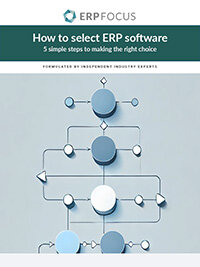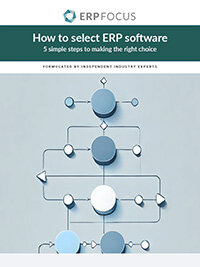Top 10 ERP Definitions You Need To Know
There is nothing worse than coming across perplexing jargon and confusing terms when researching a topic. ERP software is no different to most subjects, in the fact that it has many new definitions and acronyms which as a beginner you may not understand. That is where ERPfocus.com can help - we have selected ten of the most important ERP definitions, acronyms and jargon that you need to know.
Change Management
The process of communicating, educating, training, and explaining the affects of an upcoming change to everyone in the organization, from the C-level to the shop floor. Since ERP is such a dramatic change that affects so many people, effective ERP change management is one of the most crucial risk factors in an ERP implementation.
Cloud Computing
A broad category of technology strategies which have in common providing IT functionality over the internet. ERP Cloud computing varies from traditional models in that software, data storage, and processing occur as an on-demand service, are incrementally scalable, and may physically exist anywhere. Many ERP vendors now offer cloud ERP options alongside local software licenses.
EIS (Executive Information System)
Executive management system refers to the concept of assembling all critical business measures in an-easy-to-see (or easy-to-retrieve) format, often referred to as a dashboard. ERP EIS is often an emphasized feature in an ERP sales pitch; it is one of the few tangible outputs that appeals to the ultimate decision-makers.
ERP Charter
A project charter is the ERP team’s concise statement of core goals, objectives and intent. In essence, a charter serves as the “map” for everything that comes next. ERP selection is extremely resource intensive. When a manufacturer is doing all it can to meet the daily challenges of customer demands, it can be easy to lose the focus of the ERP project’s original priorities. (via Ultra Consultants)
ERP Hardware
A catch-all term used to describe the variety of physical components which create and maintain a computer network. Examples of hardware implemented in ERP software use include, but are not limited to: computers, servers, mainframes, wire and fiber-optic cable, modems, routers, and printers.
ERP Implementation
ERP implementation means the large-scale process of installing and configuring software, testing the solution, preparing the organization for change, training the end-users, and establishing a support organization to sustain the implementation.
Out of the Box
Out of the box is the commonly used phrase to describe uncustomized software, particularly in ERP. Since most ERP systems do not exactly match what is currently being done, there will always be tension between when to customize ERP, and when to change the local business process to conform with the "out of the box" solution.
RFP (Request for Proposal)
An RFP is a formal invitation for a vendor to participate in a bidding process when a company intends to purchase a product or service. Vendors are expected to submit a formal business proposal for fulfilling the stated requirements, including price. The winning supplier's RFP will generally serve as the basis for the "statement of work". An RFP typically occurs after an ERP vendor shortlist is created.
ROI (Return on Investment)
A standard financial measurement intended to assess the profitability effectiveness of investments, calculated - in general terms - by dividing the expected return (profit, cost savings, etc.) by the financial outlay. ROI can be used to estimate the return on a project or as a measurement of a total organization’s effectiveness.
Vendors
Vendors are companies or individuals that are willing to supply a given material or service at an agreed upon quality level in exchange for an agreed upon amount of cash. ERPfocus has just released it's ERP Software Vendor Directory for 2013 which has independent profiles and product information for over 140 ERP vendors - At least that is one less thing you have to worry about!
Free white paper

How to Select ERP
Learn to select your ERP in 5 easy steps by following our expert's advice



